|
|
|
Sort Order |
|
|
|
Items / Page
|
|
|
|
|
|
|
| Srl | Item |
| 1 |
ID:
172844
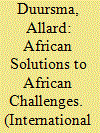

|
|
|
|
|
| Summary/Abstract |
The current scholarly literature on the international mediation of civil wars draws predominantly on a rationalist-materialist perspective. This perspective suggests that the ticket to mediation success is the material manipulation of the bargaining environment by third parties with a high degree of economic and military resources. I argue that legitimacy also determines outcomes of mediation because if a mediator has legitimacy, it can continue to look for a mutually satisfactory outcome and try to pull the conflict parties toward compliance. I show that legitimacy matters by systematically comparing the effectiveness of African and non-African third parties. African third parties are typically considered ineffective because of a low degree of economic and military capacity. However, they effectively mediate civil wars in Africa because of a high degree of legitimacy, which is a result of a strong conviction within the African society of states that African mediation is the most desirable type in conflicts there. Drawing on data from the Uppsala Conflict Data Program supplemented with unique data, which together cover all mediation efforts in Africa between 1960 and 2017, I find quantitative evidence supporting the effectiveness of African third parties. Compared to non-African ones, African third parties are far more likely to conclude negotiated settlements that are more likely to be durable. African third parties are especially effective if the conflict parties are highly committed to the African solutions norm. Theoretically, this study deviates from much of the literature that puts forward solely rationalist-materialist explanations of mediation success. By bringing legitimacy to the forefront, this article supplements the current mediation literature that emphasizes material sources of power and ignores social structures.
|
|
|
|
|
|
|
|
|
|
|
|
|
|
|
|
| 2 |
ID:
088065


|
|
|
|
|
| Publication |
2009.
|
| Summary/Abstract |
Many scholarly analyses of small economies over the past two decades have been premised on the implicit understanding that a state's small population size, compounded by such factors as islandness and remoteness from markets, is to blame for an inherent and unavoidable economic vulnerability. The article critiques the core features of this approach, and proposes in turn to discuss and profile the development trajectories of small economies from the vantage point of the strategic flexibility used by small states (at multiple levels as individuals, household units, corporate entities and complete jurisdictions) in seeking to exploit opportunities and maximize economic gains in a turbulent and dynamic external environment with which they must engage. Keeping alive a portfolio of skills and revenue streams enables these actors to migrate inter-sectorally as well as trans-nationally.
|
|
|
|
|
|
|
|
|
|
|
|
|
|
|
|
| 3 |
ID:
192008
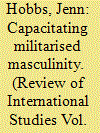

|
|
|
|
|
| Summary/Abstract |
This article examines the soldiering body in relation to the increasing prevalence of genitourinary injuries in military personnel. Feminist scholars have demonstrated that the idealised masculine soldiering body are central to the workings of international politics. The article shows that US militarised masculinity operates through the selective distribution of bodily capacities. The article draws upon critical disability studies, particularly Jasbir Puar's work on capacity and debility, to argue that treatments for genitourinary injuries revolve around the production of seminal capacity. Queer and trans bodies are debilitated in these arrangements through the denial of heterosexual and cisgender capabilities to them. To unpack this argument the article analyses treatments for genitourinary injuries. The article shows that genitourinary injuries destabilise the gender identity of US service members. Through an exploration of surgical treatments, including penis transplants and reconstructive surgeries, and fertility treatments, the article shows how masculine capacitation is achieved for some US service members through the debilitation of others; in particular, queer and trans bodies, and the bodies of Iraqi and Afghan civilians.
|
|
|
|
|
|
|
|
|
|
|
|
|
|
|
|
| 4 |
ID:
088254
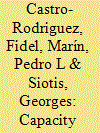

|
|
|
|
|
| Publication |
2009.
|
| Summary/Abstract |
This paper addresses the issue of investment in electricity generation in the context of a liberalised market. We use the main results derived from a theoretical model where firms invest strategically to simulate the Spanish electricity system with real-world data. Our results indicate that, under reasonable parameter constellations regarding the number of agents, the level of capacity resulting from private decisions falls well short of the social optimum. Last, we show that two regulatory mechanisms that have been used to generate additional incentives for private agents to install capacity (capacity payment and price-adder) are ineffective and/or prohibitively costly.
|
|
|
|
|
|
|
|
|
|
|
|
|
|
|
|
| 5 |
ID:
186966
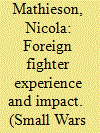

|
|
|
|
|
| Summary/Abstract |
This paper examines the relationship between prior conflict experience and the impact of foreign fighters on armed groups. This paper addresses the findings in existing research that describes foreign fighters as both assets and liabilities by disaggregating foreign fighters into first-conflict foreign fighters and veteran foreign fighters. While prior experience determines the potential impact of foreign fighters, I introduce the concept of foreign fighter integration to understand how this experience is utilized or leveraged by armed groups. The theory-building framework helps explain why we see certain groups leverage foreign fighters in ways that shape their repertoires of violence, tactics, or even ideology, while, in other instances, the influence of foreign fighters appears to be limited – with any consequent effects restricted to the small factions into which foreign fighters have been assigned. Using this theoretical framework of experience and integration, I re-examine in the cases Somalia and Bosnia and Herzegovina to demonstrate how and where foreign fighters impact armed groups.
|
|
|
|
|
|
|
|
|
|
|
|
|
|
|
|
| 6 |
ID:
162929
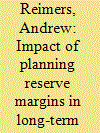

|
|
|
|
|
| Summary/Abstract |
The planning reserve margin is the predominant metric used in long-term planning models to ensure the resource adequacy of projected power systems. Considerable work has been done to estimate the contribution of variable renewable energy resources, such as wind and solar, to the planning reserve margin, but little work has been done to assess what planning reserve margin should be used in planning models. Typically, U.S.-based models use the North American Electric Reliability Corporation (NERC)-recommended reserve margin levels. However, historical reserve margins have often exceeded the NERC-recommended levels, suggesting that the use of NERC-recommended levels in planning models may negatively bias projected future capacity investments relative to real-world trends. Using the Regional Energy Deployment System capacity expansion model, we show that setting the planning reserve margin to observed levels in lieu of the NERC-recommended levels leads to substantial differences in near-term capacity additions. Scenarios using alternative specifications for the reserve margin resulted in increased national solar builds of 20–100 GW. Given that the magnitude on results from altering the reserve margin level is similar to or greater than many policies frequently analyzed with planning models, careful consideration of the reserve margin level is crucial for developing accurate power sector projections.
|
|
|
|
|
|
|
|
|
|
|
|
|
|
|
|
| 7 |
ID:
101447
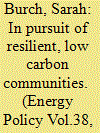

|
|
|
|
|
| Publication |
2010.
|
| Summary/Abstract |
This article presents the findings of a study that examined three municipalities in the Lower Mainland of British Columbia, Canada, in order to determine the nature of the socio-cultural and institutional barriers to action on climate change at the local level. The central goals of this paper are: (1) to propose a simple typology of institutional and socio-cultural barriers to action by gathering insights from an inter-disciplinary set of literatures; (2) to explore the ways that these barriers influence the utilization of various forms of capacity to achieve greenhouse gas reduction and resiliency in three case study communities; and (3) to understand the dynamic interactions amongst, and relative importance of, these barriers at the local level. The evidence presented in this paper indicates that barriers are deeply interwoven phenomena, which may reinforce one another and create substantial inertia behind unsustainable patterns of municipal operations. Nevertheless, the same factors that can inhibit action on climate change (such as an organizational culture of combativeness or mutual disrespect) can also facilitate it (as with a culture of collaboration or innovation). This article suggests that a deeper understanding of the ways in which barriers can be transformed into enablers of action is a critical next step in the evolution climate change policy design and implementation at the local level.
|
|
|
|
|
|
|
|
|
|
|
|
|
|
|
|
| 8 |
ID:
197870


|
|
|
|
|
| Summary/Abstract |
This paper discusses military applications of solving maximum flow/minimum cut problems in a transport
network and flow problems in a constrained network. The high computational complexity of some current military
network flow problems is highlighted.
|
|
|
|
|
|
|
|
|
|
|
|
|
|
|
|
| 9 |
ID:
116741
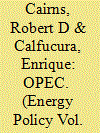

|
|
|
|
|
| Publication |
2012.
|
| Summary/Abstract |
The actions of OPEC and Saudi Arabia are discussed in terms of their objectives and their technical and social constraints. It is concluded (1) that OPEC does not act as a cartel and (2) that Hotelling's rule is not an important feature of pricing or production. OPEC's (more specifically, Saudi Arabia's) ideal policy is to keep price moderate to try to assure a market for their high reserves over the long run. Such an action would require heavy investments in capacity, including in excess capacity, for times of interruption of supply from other countries as in the 1990s and for times of high demand as in the 2000s. The action may be inconsistent with other objectives and in any case may be too difficult to achieve.
|
|
|
|
|
|
|
|
|
|
|
|
|
|
|
|
| 10 |
ID:
097675
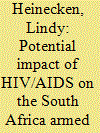

|
|
|
|
|
| Publication |
2009.
|
| Summary/Abstract |
HIV/AIDS has wide ramifications for the armed forces, especially in those regions where
the epidemic is most prevalent. Understanding how this disease affects armed forces and
more specifically the SANDF as regional military power is not only of national but also
of regional and international concern. In this article an attempt is made to uncover how
HIV/AIDS affects force procurement, namely the ability to recruit suitable candidates
for military service in South Africa. The discussion then moves to within the SANDF
and an effort is made to indentify possible problem areas in terms of personnel shortages
by looking at current rates of attrition in certain age and occupational categories. In
light of this, the impact on force employment and deployment is assessed. In the final
section the influence HIV/AIDS has on force sustainment is discussed, as well as the
health, financial and diplomatic and human rights implications this disease poses for
armed forces.
|
|
|
|
|
|
|
|
|
|
|
|
|
|
|
|
| 11 |
ID:
149601
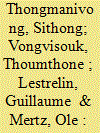

|
|
|
|
|
| Summary/Abstract |
The prospects of receiving funding for REDD+ have set many developing countries on a pathway of policy reforms to integrate REDD+ in national legislation. Progress has been slow partly due to the lengthy international negotiations on REDD+ but also because the policy reforms have not been backed by sufficient commitment to make REDD+ implementation feasible. To contribute to a better understanding of why policy and institutional reforms have not been successful in taking REDD+ implementation further, we analyse the institutional landscape of the forestry and environmental sectors in Laos as a case in point. We interviewed stakeholders from national to village levels and found that REDD+ has been effectively on hold in Laos. This is because of recent institutional transformations, rapid staff turnover and limited implementation capacity of government agencies at the national and sub-national levels all of which have led to a heavy reliance on international support and external consultants. The result is that Laos may not be ready to benefit from the international agreement on REDD+. The situation in Laos provides a compelling example of how difficult REDD+ implementation has proven to be in countries where institution building is still in process.
|
|
|
|
|
|
|
|
|
|
|
|
|
|
|
|
| 12 |
ID:
146917
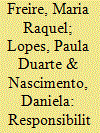

|
|
|
|
|
| Summary/Abstract |
Despite its many institutional and political weaknesses and limitations, the African Union (AU) has been developing a variety of tools and mechanisms to respond effectively to complex disasters and emergencies (both natural and manmade) by building up a comprehensive regional security architecture. Furthermore, it has become the first and only regional or international organisation to enshrine the principle of ‘responsibility to protect’ (R2P) in its Constitutive Act. This regional approach to and formal endorsement of the R2P principle allowed it to assume a particular place in the promotion of peace and security in its area. This article aims to critically assess the effectiveness of the AU on the African continent by exploring its real capacity in preventing and responding to emergencies and violent conflicts, and therefore in rendering the principle of R2P operational. The article argues that the formalisation of principles does not necessarily mean their effective implementation. The organisation's use of the R2P principle is also greatly conditioned by internal and external factors.
|
|
|
|
|
|
|
|
|
|
|
|
|
|
|
|
| 13 |
ID:
177477
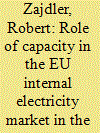

|
|
|
|
|
| Summary/Abstract |
Since the judgment in Case 6/64 Costa v ENEL electricity (electrical energy) has been considered as ‘good’ subject to the principle of free movement of goods of the European Union (EU). Although the EU electricity market has undergone fundamental regulatory and technological changes, this qualification still determines the assessment of regulatory solutions. The changes that have taken place have made it possible for resource adequacy to be ensured not only by generators but also by “demand side management”. It changes the market from a single-product market where electricity is the exclusive commodity (‘good’) traded to a two-commodity market where capacity securing resource adequacy is the second product. It raises the question if the capacity is good or service and how it affects qualification of electricity as a good and a model for developing EU regulation based on this assumption. In Case T-793/14 Tempus Energy the General Court challenged the British capacity market which also affected the Polish one, showing the need for delimitation of this concept. The aim of this article is to try to give answers to these questions. The article aims to propose such a delimitation and the consequences that result from for the EU electricity market.
|
|
|
|
|
|
|
|
|
|
|
|
|
|
|
|
| 14 |
ID:
089335
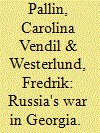

|
|
|
|
|
| Publication |
2009.
|
| Summary/Abstract |
The Russian military operation during the Five-Day war in Georgia points to a number of lessons with strategic implications for Russia. The deficiencies in its military performance - not least concerning C4ISR and precision strike capability - have underscored the need for a modernization of the Armed Forces and a diversification of Russia's military capability. Russia needs to arrive at a strategic decision on the priorities for the future development of its military and defence industry: should it prepare for large-scale wars or post-modern warfare and counter-insurgence? In the meantime, the scope of Russian military strategy will be clearly limited and military force will remain a powerful but blunt security policy instrument.
|
|
|
|
|
|
|
|
|
|
|
|
|
|
|
|
| 15 |
ID:
182698
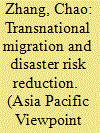

|
|
|
|
|
| Summary/Abstract |
Migrants can be disproportionately impacted by disasters due to their increased vulnerability. Knowledge of Chinese migrants' perceptions and experiences in the face of hazards and disasters is limited. This qualitative descriptive study explored Chinese migration in relation to disasters and disaster risk reduction in New Zealand. Semi-structured interviews with 22 Chinese migrants living in Auckland were conducted and data were thematically analysed. Participants displayed strong transnationalism via the creation of ‘mini-China’ and conceptions of China as their ‘mother’ country and New Zealand their ‘step-mother’ country. Chinese migrants compared their experiences of disasters in China to those in New Zealand, with many expressing difficulties with accessing information and not trusting New Zealand government authorities, particularly given how the approach contrasts to China's more ‘hands on’ approach. Fear of losing life and property and responsibility to their family were key factors underpinning Chinese migrants' decision to prepare for a disaster. Participants shared insights to guide disaster risk reduction efforts from a community level and expressed a willingness to participate in disaster preparedness organised by agencies involved in disaster risk reduction. The findings indicate capacities of Chinese migrants that planners can leverage and highlight important cultural nuances that need attention in future planning.
|
|
|
|
|
|
|
|
|
|
|
|
|
|
|
|
| 16 |
ID:
078782
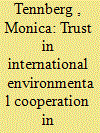

|
|
|
|
|
| Publication |
2007.
|
| Summary/Abstract |
In this article, I discuss trust and its manifestations in international environmental cooperation. A lack of trust in the capacity of states and other actors to tackle environmental issues leads to international environmental insecurity. Awareness of such incapacities is widespread and is increasing in `modern risk societies'. Trust is often understood as the rational and intentional efforts of parties to treat one another as trustworthy counterparts and to ignore discretion, but it is also habitual. Trust is based on the socialization of agents into certain practices. The importance of trust and its different dimensions emerged as the central theme in a study of international environmental cooperation in northwestern Russia. Russian and Nordic participants were interviewed in the winter 2003-2004 and spring 2006 with the aim of gathering their views and experiences on cooperation. The interviewees were mainly representatives of regional and national administrations and non-governmental organizations. In addition, in the autumn of 2004 and again in the autumn of 2006, a questionnaire was sent to project managers working in northwestern Russia. The article highlights the importance of the institutional dimension of trust in terms of trust in abstract expertise and monetary systems as well as trust in the representatives of such systems. Both trust and the lack of trust remain important issues, especially in regard to the Russian capacity to develop domestic environmental policies and to improve the status of Russia in international environmental cooperation
|
|
|
|
|
|
|
|
|
|
|
|
|
|
|
|
| 17 |
ID:
116069
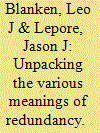

|
|
|
|
|
| Publication |
2012.
|
| Summary/Abstract |
The authors engage in the debate over waste in military force structure planning by rigorously deconstructing the concept of "redundancy." First, a typology of redundancy is constructed that provides a common framework for identifying variety among redundant structures. These are labeled "true redundancy," "expanded capacity," "portfolio diversification," and "mission overlap." Further, a number of mechanisms are identified that produce these types of structures, and show the conditions under which planners may utilize redundant structure in the search for optimization. In sum, the article provides refined concepts for analysts and planners to identify when redundancy is deleterious or beneficial.
|
|
|
|
|
|
|
|
|
|
|
|
|
|
|
|
| 18 |
ID:
088001
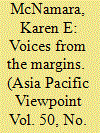

|
|
|
|
|
| Publication |
2009.
|
| Summary/Abstract |
This paper captures some of the structural deficiencies within the United Nations' decision-making processes at its headquarters in New York. Ideas and methodological approaches from critical geopolitics are adopted here to examine semi-structured interviews held with Pacific ambassadors (n = 7) at the United Nations and bring new knowledge to an underexplored area. Results demonstrate that the institutional capacities of Pacific small island states hinder their ability to voice their concerns adequately at every United Nations' forum, while shifting imaginaries and a decline in popularity of issues has seen a drop in on-the-ground financial assistance for these states. In this way, this paper attempts to contribute to our understanding of the practice of international diplomacy within the United Nations.
|
|
|
|
|
|
|
|
|
|
|
|
|
|
|
|
|
|
|
|
|